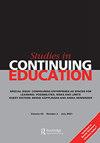Putting professional learning practice first in innovative learning environments
IF 1.9
4区 教育学
Q2 EDUCATION & EDUCATIONAL RESEARCH
引用次数: 0
Abstract
ABSTRACT Considerable investment has been made to redesign built spaces in schools, with an assumption not based on research evidence embedded in both the architectural and educational literature that this will improve teaching and learning practices. In this study of 12 Victorian case studies in Australia schools were selected based on OECD criteria, not including the built environment, of an innovative learning environment (ILE). Yet each school had in their ILE redesigned the built space to enable different pedagogical practice. More collaborative teaching practice and pedagogical change emerged to be closely associated with redesigned built environments. Furthermore, for schools to fully benefit from the affordances of redesigned built space and connectivity of mobile technologies, putting the professional learning of teachers first was necessary to both initiate and sustain different pedagogical practices. Drawing on practice architectures theory, we illustrate how the conjuncture of the material-economic context of redesigned built environment and technologies, the cultural-discursive assemblage of discourses regarding the needs of twenty-first century learner-earners and the social-political context of policies enabled action-oriented teacher professional development. These conditions shaped the conduct of practice, the ‘sayings’, ‘doings’ and ‘relatings’ of teacher professional learning both within each school and across the Victorian public system.在创新的学习环境中将专业学习实践放在首位
大量的投资被用于重新设计学校的建筑空间,而不是基于建筑和教育文献中嵌入的研究证据,假设这将改善教学和学习实践。在这项研究中,澳大利亚维多利亚州的12所学校的案例研究是根据经合组织的标准选择的,不包括建筑环境,创新学习环境(ILE)。然而,每个学校都在他们的ILE中重新设计了建筑空间,以实现不同的教学实践。与重新设计的建筑环境密切相关,更多的合作教学实践和教学变革出现了。此外,为了让学校充分受益于重新设计的建筑空间和移动技术的连接性,将教师的专业学习放在首位是启动和维持不同教学实践的必要条件。利用实践建筑理论,我们说明了重新设计的建筑环境和技术的物质经济背景,关于21世纪学习者-收入者需求的文化话语组合以及政策的社会政治背景如何使以行动为导向的教师专业发展成为可能。这些条件塑造了实践的行为、教师专业学习的“说法”、“行为”和“关系”,无论是在每所学校还是整个维多利亚公共系统内。
本文章由计算机程序翻译,如有差异,请以英文原文为准。
求助全文
约1分钟内获得全文
求助全文
来源期刊

Studies in Continuing Education
EDUCATION & EDUCATIONAL RESEARCH-
CiteScore
4.70
自引率
6.70%
发文量
22
期刊介绍:
Studies in Continuing Education is a scholarly journal concerned with all aspects of continuing, professional and lifelong learning. It aims to be of special interest to those involved in: •continuing professional education •adults learning •staff development •training and development •human resource development
 求助内容:
求助内容: 应助结果提醒方式:
应助结果提醒方式:


